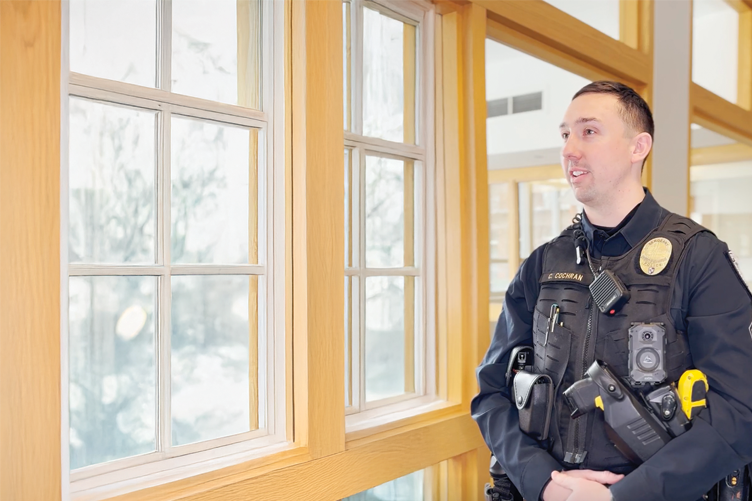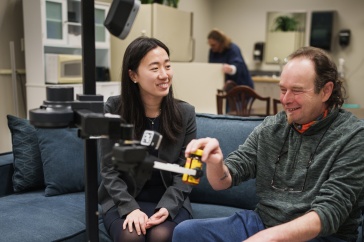
For UNH Police Sgt. Callum Cochran, law enforcement isn’t just about enforcing rules — it’s about understanding people.
This drive to better understand people led him to the UNH online master of social work program to pursue a degree that will help him become a leader in improving mental health resources for first responders.
“My specific focus is looking at the lack of resources for first responders and looking at how we can do it differently to better support them,” Cochran says.
A Proud Member of the UNH Community
In many ways, Cochran’s transition to student is a natural step in his journey with the university, because he enjoys learning and teaching.
Before coming to UNH in 2017, Cochran worked part-time in the nearby communities of Madbury and Hampton. The opportunity at UNH gave him the chance to go full time and build a career.
He seized the opportunity, advancing from junior patrol officer to evening shift supervisor while taking on multiple leadership roles, including community policing liaison and defensive tactics instructor.
Cochran says UNH offers a distinct and constantly evolving environment, where the community remains rooted in a steady flow of college-aged students. For those working on campus, it creates a unique dynamic — while they grow older, the population they engage with stays the same age.
“UNH has always been described as a melting pot, people from all different walks of life come together here. That gives us the opportunity to provide positive interactions with law enforcement, which can help shift and shape people’s perspectives,” Cochran says. “One of the most rewarding aspects of my job is that people get to know me as a person, not just as someone in uniform.”
Bridging the Gap: Law Enforcement and Mental Health
As his career in law enforcement progressed, Cochran recognized a significant gap in mental health support for first responders. This realization motivated him to continue his education, utilizing UNH’s tuition benefits to earn his bachelor’s degree through Granite State College before enrolling in a master’s program in social work.
Already an active Strafford County peer-to-peer team member, Cochran participates in debriefs for critical incidents and provides confidential support for fellow officers. His role has reinforced his belief in the need for better mental health resources within law enforcement, an issue he hopes to address through his social work studies.
“I want my master's in social work to complement my profession. I want it to add credibility for who I am as an officer,” Cochran says. “With my background with use of force training and defensive tactics, de-escalation, and how to respond to mental illnesses, I think a lot of that can coincide with being able to look at how we do training and what we can do differently to make it better for the officers in the long run.”
Cochran and Katie Godshall, clinical assistant professor of social work, have applied for a research grant to use virtual reality training systems to do scenario-based training for law enforcement that would measure how the body responds to stress.
"We're examining how the body responds to stress, particularly by measuring heart rate and respiratory rate — key indicators in high-pressure situations,” Cochran says. “First responders are especially exposed to these incidents, and while they may appear calm on the surface, their biometric feedback often tells a different story. Our goal is to help them recognize these physiological responses, channel them effectively, and develop better coping strategies."
Godshall says it’s been a great experience working with Cochran, and she appreciates his eagerness to have a positive impact on both professions.
“Having students who serve in the role of public safety personnel enhances our program and student experience, but most importantly, can aid in the development of trust and understanding between social work and first responders,” Godshall says. “This is a high-risk population that has historically been underserved in the areas of wellness and health. There are numerous factors, such as the culture of first responders, that has a deeply ingrained mistrust of outsiders, and anything related to mental wellness. We are actively seeing a shift in this culture and an openness to explore opportunities that will support first responders in the short and long term. Having more crossover in training of social workers and first responders will better address the need and improve community outcomes and relationships.”
The Life of a Student
Balancing work, family, and coursework has given Cochran a newfound appreciation for the challenges students face in meeting deadlines and managing responsibilities. While UNH’s online program offers flexibility, time management remains crucial for Cochran.
“I’ve learned that if you have that free time, take advantage of it and get ahead of your coursework,” Cochran says. “Don't wait until the last minute because you never know what surprise is going to happen.”
In addition to continuing his coursework, Cochran is looking forward to two upcoming internship experiences — one focusing on one-on-one client interactions and another on macro-level policy and program development.
He hopes all these experiences unite to bridge the gap between law enforcement and mental health services, ensuring that officers and the communities they serve receive the support they need.
“Knowledge is power, and by putting myself in a program that's not always associated with first responders, specifically police officers, it gives me a unique opportunity to expand my relationship within the UNH community, but also help the profession as a whole,” Cochran says.
-
Written By:
Aaron Sanborn | UNH Paul College & CHHS | aaron.sanborn@unh.edu
















































